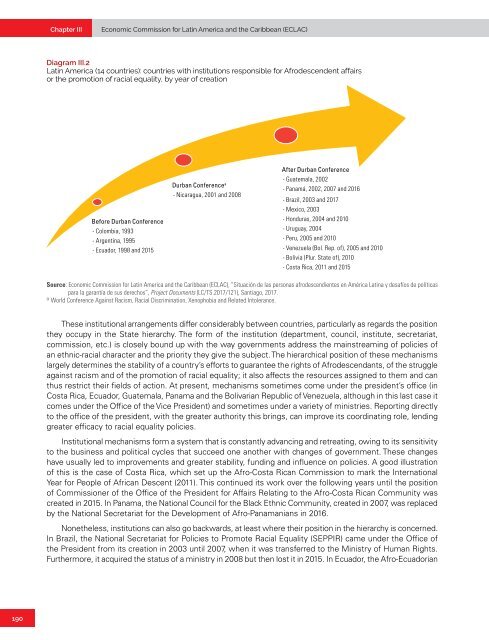Draft first regional report on the implementation of the Montevideo Consensus on Population and Development
This draft report seeks to give an account of progress in the implementation of the priority measures of the Montevideo Consensus on Population and Development in the region, as well as the differences between countries in terms of the degree of implementation. By highlighting relevant national experiences, it also seeks to facilitate the exchange of good practices among countries so that they can benefit from each other in their efforts to advance the implementation of the actions of the Montevideo Consensus.
This draft report seeks to give an account of progress in the implementation of the priority measures of the Montevideo Consensus on Population and Development in the region, as well as the differences between countries in terms of the degree of implementation. By highlighting relevant national experiences, it also seeks to facilitate the exchange of good practices among countries so that they can benefit from each other in their efforts to advance the implementation of the actions of the Montevideo Consensus.
You also want an ePaper? Increase the reach of your titles
YUMPU automatically turns print PDFs into web optimized ePapers that Google loves.
Chapter III<br />
Ec<strong>on</strong>omic Commissi<strong>on</strong> for Latin America <strong>and</strong> <strong>the</strong> Caribbean (ECLAC)<br />
Diagram III.2<br />
Latin America (14 countries): countries with instituti<strong>on</strong>s resp<strong>on</strong>sible for Afrodescendent affairs<br />
or <strong>the</strong> promoti<strong>on</strong> <strong>of</strong> racial equality, by year <strong>of</strong> creati<strong>on</strong><br />
Before Durban C<strong>on</strong>ference<br />
- Colombia, 1993<br />
- Argentina, 1995<br />
- Ecuador, 1998 <strong>and</strong> 2015<br />
Durban C<strong>on</strong>ference a<br />
- Nicaragua, 2001 <strong>and</strong> 2008<br />
After Durban C<strong>on</strong>ference<br />
- Guatemala, 2002<br />
- Panamá, 2002, 2007 <strong>and</strong> 2016<br />
- Brazil, 2003 <strong>and</strong> 2017<br />
- Mexico, 2003<br />
- H<strong>on</strong>duras, 2004 <strong>and</strong> 2010<br />
- Uruguay, 2004<br />
- Peru, 2005 <strong>and</strong> 2010<br />
- Venezuela (Bol. Rep. <strong>of</strong>), 2005 <strong>and</strong> 2010<br />
- Bolivia (Plur. State <strong>of</strong>), 2010<br />
- Costa Rica, 2011 <strong>and</strong> 2015<br />
Source: Ec<strong>on</strong>omic Commissi<strong>on</strong> for Latin America <strong>and</strong> <strong>the</strong> Caribbean (ECLAC), “Situación de las pers<strong>on</strong>as afrodescendientes en América Latina y desafíos de políticas<br />
para la garantía de sus derechos”, Project Documents (LC/TS.2017/121), Santiago, 2017.<br />
a<br />
World C<strong>on</strong>ference Against Racism, Racial Discriminati<strong>on</strong>, Xenophobia <strong>and</strong> Related Intolerance.<br />
These instituti<strong>on</strong>al arrangements differ c<strong>on</strong>siderably between countries, particularly as regards <strong>the</strong> positi<strong>on</strong><br />
<strong>the</strong>y occupy in <strong>the</strong> State hierarchy. The form <strong>of</strong> <strong>the</strong> instituti<strong>on</strong> (department, council, institute, secretariat,<br />
commissi<strong>on</strong>, etc.) is closely bound up with <strong>the</strong> way governments address <strong>the</strong> mainstreaming <strong>of</strong> policies <strong>of</strong><br />
an ethnic-racial character <strong>and</strong> <strong>the</strong> priority <strong>the</strong>y give <strong>the</strong> subject. The hierarchical positi<strong>on</strong> <strong>of</strong> <strong>the</strong>se mechanisms<br />
largely determines <strong>the</strong> stability <strong>of</strong> a country’s efforts to guarantee <strong>the</strong> rights <strong>of</strong> Afrodescendants, <strong>of</strong> <strong>the</strong> struggle<br />
against racism <strong>and</strong> <strong>of</strong> <strong>the</strong> promoti<strong>on</strong> <strong>of</strong> racial equality; it also affects <strong>the</strong> resources assigned to <strong>the</strong>m <strong>and</strong> can<br />
thus restrict <strong>the</strong>ir fields <strong>of</strong> acti<strong>on</strong>. At present, mechanisms sometimes come under <strong>the</strong> president’s <strong>of</strong>fice (in<br />
Costa Rica, Ecuador, Guatemala, Panama <strong>and</strong> <strong>the</strong> Bolivarian Republic <strong>of</strong> Venezuela, although in this last case it<br />
comes under <strong>the</strong> Office <strong>of</strong> <strong>the</strong> Vice President) <strong>and</strong> sometimes under a variety <strong>of</strong> ministries. Reporting directly<br />
to <strong>the</strong> <strong>of</strong>fice <strong>of</strong> <strong>the</strong> president, with <strong>the</strong> greater authority this brings, can improve its coordinating role, lending<br />
greater efficacy to racial equality policies.<br />
Instituti<strong>on</strong>al mechanisms form a system that is c<strong>on</strong>stantly advancing <strong>and</strong> retreating, owing to its sensitivity<br />
to <strong>the</strong> business <strong>and</strong> political cycles that succeed <strong>on</strong>e ano<strong>the</strong>r with changes <strong>of</strong> government. These changes<br />
have usually led to improvements <strong>and</strong> greater stability, funding <strong>and</strong> influence <strong>on</strong> policies. A good illustrati<strong>on</strong><br />
<strong>of</strong> this is <strong>the</strong> case <strong>of</strong> Costa Rica, which set up <strong>the</strong> Afro-Costa Rican Commissi<strong>on</strong> to mark <strong>the</strong> Internati<strong>on</strong>al<br />
Year for People <strong>of</strong> African Descent (2011). This c<strong>on</strong>tinued its work over <strong>the</strong> following years until <strong>the</strong> positi<strong>on</strong><br />
<strong>of</strong> Commissi<strong>on</strong>er <strong>of</strong> <strong>the</strong> Office <strong>of</strong> <strong>the</strong> President for Affairs Relating to <strong>the</strong> Afro-Costa Rican Community was<br />
created in 2015. In Panama, <strong>the</strong> Nati<strong>on</strong>al Council for <strong>the</strong> Black Ethnic Community, created in 2007, was replaced<br />
by <strong>the</strong> Nati<strong>on</strong>al Secretariat for <strong>the</strong> <strong>Development</strong> <strong>of</strong> Afro-Panamanians in 2016.<br />
N<strong>on</strong>e<strong>the</strong>less, instituti<strong>on</strong>s can also go backwards, at least where <strong>the</strong>ir positi<strong>on</strong> in <strong>the</strong> hierarchy is c<strong>on</strong>cerned.<br />
In Brazil, <strong>the</strong> Nati<strong>on</strong>al Secretariat for Policies to Promote Racial Equality (SEPPIR) came under <strong>the</strong> Office <strong>of</strong><br />
<strong>the</strong> President from its creati<strong>on</strong> in 2003 until 2007, when it was transferred to <strong>the</strong> Ministry <strong>of</strong> Human Rights.<br />
Fur<strong>the</strong>rmore, it acquired <strong>the</strong> status <strong>of</strong> a ministry in 2008 but <strong>the</strong>n lost it in 2015. In Ecuador, <strong>the</strong> Afro-Ecuadorian<br />
190


















